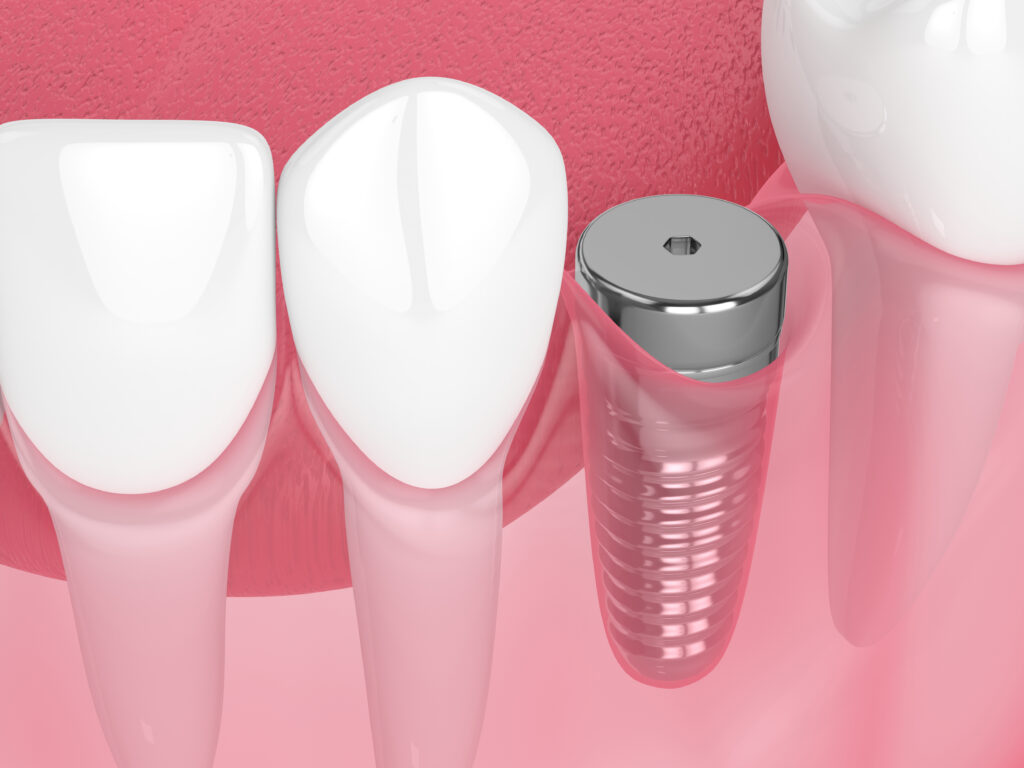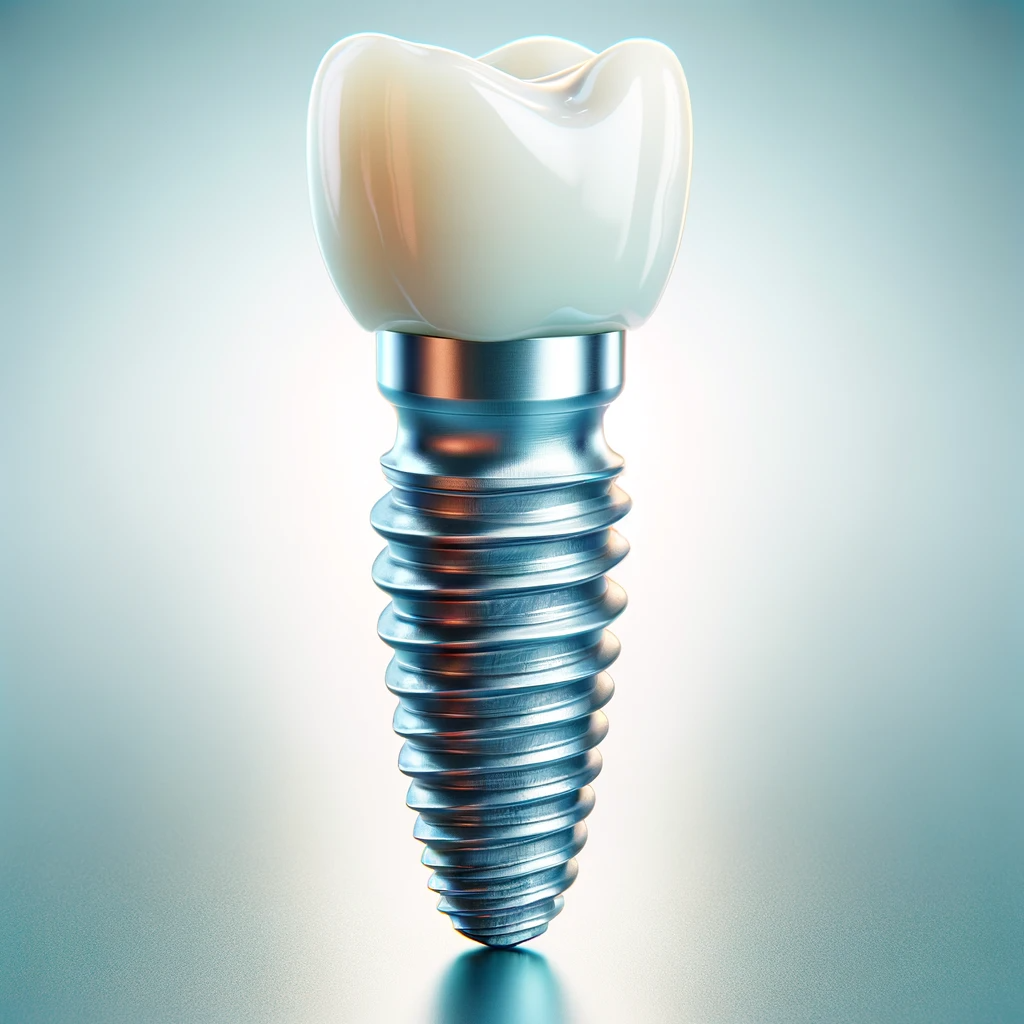Dental Implant Perth
In the bustling city of Perth, individuals with missing teeth have a reliable solution to regain their smile and boost their confidence. Dentists in Perth, specialise in providing dental implants that offer a durable and visually appealing solution closely resembling your natural teeth.
Unlike removable dentures, dental implants provide a fixed solution to missing or damaged teeth, contributing to better oral health. Our Perth dental implant clinic provides a range of dental implant services catering to the needs of individuals, whether they require a replacement for a single tooth or multiple teeth.
As a solid foundation for artificial teeth, dental implants play a crucial role in restoring the aesthetics and functionality of your smile, making them a sought-after dental treatment for those looking to fill the gaps left by lost teeth.

What Are Dental Implants?
Dental implants are a fantastic solution for people with missing teeth. They act as replacement teeth and are designed to blend in with your natural teeth. Unlike traditional dentures or bridges, dental implants offer a more permanent and natural-feeling solution.
The dental implant procedure involves placing artificial tooth roots into the jawbone, providing a solid foundation for the fixed or removable false teeth. This common dental procedure is carried out by oral surgeons trained to restore your smile and maintain oral health.
Dental implants are one of the best treatment options to replace missing teeth and improve oral health. One of the key advantages is that dental implants offer a durable solution, mimicking the function and appearance of your natural teeth. Whether you have lost a single tooth due to an accident or have multiple missing teeth due to gum disease, implant dentistry is the solution to restore your smile.
Seeking regular dental care and consulting with experienced South Perth dentists can help you understand if dental implants are the right choice for you. Our implant dentist will evaluate your oral health, discuss the different treatment options, and guide you through the dental implant procedure to ensure you achieve the desired outcome.
A comprehensive dental exam, including X-rays or 3D images, a review of your medical history, and treatment planning, is part of the evaluation process for dental implants.
Types of Dental Implants
In Perth, individuals seeking to replace missing teeth have several options to restore their smile. The type of dental implant chosen can significantly impact one’s experience and the final outcome. Below are the common types of dental implants available, each suited to different needs and circumstances.
Endosteal Implants
Endosteal implants are the most common type of dental implants. They are placed directly into the jawbone, providing a stable and natural-feeling solution for those with missing teeth. Once the surrounding gum tissue has healed, a second surgery is required to connect a post to the original implant, upon which the false teeth are attached.
Subperiosteal Implants
Subperiosteal implants are a good choice for individuals who do not have enough healthy natural jawbone and are unable or unwilling to undergo a bone augmentation procedure to build up the needed bone. These implants are placed on top of the jawbone but beneath the gum tissue, providing a solid foundation for the artificial teeth.
Zygomatic Implants
Zygomatic implants are the least common type but can be an option for individuals who do not have enough jawbone for Endosteal implants. They are longer and anchored in the zygomatic bone, also known as the cheekbone. This type of implant provides a strong foundation for replacement teeth, even in patients with significant bone loss in the upper jaw.
Each type of implant is designed to cater to specific needs, making dental implant treatment a versatile solution for various oral health scenarios.
Comparing Dental Implants and Removable Dentures
When it comes to replacing missing natural teeth, several options are available. Two of the most common solutions are dental implants and dentures.
Dental implants are a more permanent solution involving a surgical procedure where an implant dentist places a titanium post into the jawbone, which then holds an artificial tooth or implant crown. On the other hand, dentures are prosthetic teeth set in a plastic or metal framework that can be taken out and cleaned daily.
The key difference between the two lies in their functionality and appearance. Dental implants feel and look like your natural teeth, providing a stable and comfortable fit. They also promote dental health as they prevent bone loss, which typically occurs with missing teeth. Conversely, removable dentures might not offer the same natural appearance and comfort. They may move around, sometimes making eating or speaking challenging. However, they are usually more affordable and quicker to get fitted compared to dental implants.
Comparing Dental Implants and Dental Bridges
Another common method to replace a missing tooth or teeth is through bridges. Unlike dental implants, which are rooted in the jawbone, bridges are anchored to the existing teeth. This option doesn’t require a surgical procedure and is generally less invasive.
Dental implants, on the other hand, offer a more long-term solution. They preserve the bone and mimic the function of natural teeth. Getting dental implants involves surgery, where an implant dentist performs surgical procedures to place the implant into the jawbone, which then holds the implant crown.
Dental bridges are quicker to place and less expensive upfront, but they don’t offer the same durability or bone health benefits as dental implants. Over time, the bones around a dental bridge can begin to recede, which is not an issue with dental implants. Both teeth implants and bridges have benefits and drawbacks, and the right choice often depends on the individual’s oral health, budget, and personal preferences.

The Importance of Jawbone Quality
The quality of your jawbone is a crucial factor when considering dental implants. A strong jawbone provides the necessary support for the dental implant, ensuring it stays securely in place. A sturdy jawbone is essential for successful dental implant procedures, as it provides a solid foundation for the implant, much like roots do for natural teeth.
Without enough healthy bone, the dental implant may not withstand the daily pressure from chewing. A weakened jawbone could result from various factors such as advanced gum disease, tooth decay, or previous extractions.
Your dentist will assess the condition of your jawbone before proceeding with dental implant procedures to ensure the best chance of success.
What is Bone Grafting?
Bone grafting is a dental implant procedure that helps to build up a deteriorated or thinned jawbone. It’s a common preparatory step for individuals who need dental implants but lack the necessary bone density.
Types of bone grafts:
Autograft: Bone taken from another area of your own body.
Allograft: Bone sourced from a human donor.
Xenograft: Bone derived from a non-human species, usually a cow.
Alloplast: A synthetic bone substitute.
The Process of Bone Grafting
Bone grafting is an oral surgery performed by a specialised implant dentist or oral surgeon. Initially, a thorough examination is conducted to determine the extent of bone loss and the type of bone graft needed.
During the surgery, the selected bone grafts are placed into the jawbone areas requiring augmentation. Over time, your jaw bone will heal and merge with the graft material, creating a stronger, more solid foundation for the dental implant.
After the surgery, proper care is crucial to ensure successful healing and integration of the bone grafts. It includes following the post-operative instructions provided by your implant dentist, such as taking prescribed medications to prevent infection and scheduling follow-up visits to monitor the healing process.
Consultation Before Dental Implant Treatment
Before going through the procedure, a thorough consultation is crucial. This consultation at our dental clinic will include a comprehensive examination of your oral health to determine the most suitable dental implant treatments for you.
Whether you need a single dental implant, four dental implants, or multiple tooth implants to replace a missing tooth or teeth, a personalised treatment plan will be created to meet your specific needs. This step ensures that you receive high-quality dental implants and dental care.
During this consultation, sleep dentistry options may be discussed, particularly for patients who experience dental phobia or have special needs, to ensure a comfortable and anxiety-free treatment experience
The Dental Implant Surgery: A Step-by-step Guide
Initial Consultation
The journey towards restoring your smile begins with an initial consultation. Here, your dental implant needs and dental care history will be thoroughly assessed to create a personalised treatment plan for the dental implant surgery.
Bone Grafting (If Necessary)
If your jawbone isn’t strong enough to support dental implants, bone grafts may be necessary. This procedure helps in creating a solid base for the implant.
Implant Placement
Now comes the core part of dental implant surgery – dental implant placement. A specialised surgeon will carefully insert the implant into your jawbone, laying the foundation for your new tooth.
Osseointegration
Osseointegration is the process where the dental implant fuses with your jawbone. It’s a crucial step to ensure the stability and longevity of the dental implant.
Abutment Placement
Once osseointegration is complete, the implant abutment is attached to the dental implant. This piece will hold your new tooth in place.
Crown Attachment
The final step is attaching the crown to the implant abutment. Your dental implant treatment is complete, and you have a new, sturdy tooth that looks and feels natural. After your dental implant treatment, it’s essential to maintain good oral hygiene and follow the proper care instructions provided by your dentist to ensure the longevity of your dental implants.
Recovery and Aftercare
After the implant placement, the recovery phase begins. Following the guidelines provided by your dental implant dentists is crucial for a smooth recovery and the longevity of your dental implant. A personalised treatment plan will be provided to you, detailing the steps for proper care and maintenance. Maintaining good oral hygiene is fundamental to preventing infections and ensuring the success of the implant placement. Your dental implant dentists will schedule follow-up appointments to monitor your recovery and address any concerns you may have.
Benefits of Dental Implant Treatment
Opting for dental implant treatment is a decision that comes with an array of benefits, contributing to both your oral health and overall well-being.
Improved Aesthetics
One of the notable benefits of a single dental implant or multiple implants is the significant improvement in aesthetics. Whether replacing a single tooth or several, dental implants provide a natural, beautiful appearance that can dramatically enhance your smile and boost your confidence.
Enhanced Functionality
With dental implants, the functionality of your teeth is restored. They offer a stable and strong solution that allows you to eat, speak, and smile with ease, just like with your natural teeth. Dental implants’ secure fit and sturdy construction offer comfort and functionality that other solutions may not provide.
Bone Preservation
Dental implants help preserve the bone in your jaw, preventing the bone loss that often occurs after losing teeth. The implant placement stimulates the bone, promoting its health and strength, which is crucial for maintaining the structural integrity of your jaw and face.
Long-Term Solution
Dental implants are designed to last many years and can last a lifetime with proper care. Unlike other dental solutions that may need to be replaced or adjusted over time, dental implants provide a durable, long-term solution for those looking to replace missing natural teeth. Your personalised treatment plan will include guidelines on how to care for your dental implants to ensure they remain a lasting part of your smile.
Risks and Complications Associated with Dental Implants
Like other surgical procedures, implant procedures may carry some risks. These might include infection at the implant site, injury to surrounding structures, nerve damage, and sinus problems. The risk of complications is higher if a person has certain health conditions or habits, such as smoking, which might delay healing.
How to Mitigate Risks Post-Implant Surgery
Mitigating risks post-surgery primarily involves following the post-operative care instructions provided by your dentist. It includes taking prescribed antibiotics to prevent infection, avoiding certain activities, and practising good oral hygiene. Regular follow-up appointments with your dentist can also help identify and address any issues before they become serious.
Signs of Complications to Watch For
Some signs of complications to watch for include severe pain that doesn’t improve with time, signs of infection such as fever, implant loosening, and swelling or bleeding that gets worse instead of better. If you experience any of these signs, contacting your dentist immediately is crucial.
Success Rate of Dental Implants
Dental implants have a high success rate, often above 95%. The success of dental implant surgery can be influenced by the area of the jaw where the implant is placed, the skill of the dental surgeon, and proper post-operative care by the patient.
Maintaining Your Dental Implants
Maintaining dental implants involves regular dental check-ups and good oral hygiene practices such as brushing, flossing, and using an antimicrobial mouthwash. It’s also advisable to avoid chewing on hard items to prevent damaging your implants.
Are You a Suitable Candidate for Dental Implants?
Suitable candidates for dental implants are those with good general and oral health, adequate bone in the jaw to support the implants, and healthy gum tissues free of periodontal disease. Individuals with certain health conditions or habits may need to be evaluated case-by-case. It’s best to consult with a dental professional to determine your suitability for dental implants.
Cost of Dental Implants in Perth
The dental implant cost in Perth can vary significantly based on several factors, including the complexity of the procedure, the number of implants needed, and the specific dental clinic you choose. It’s essential to have a detailed consultation with your implant dentist to understand the dental implant costs and receive a personalised quote.
Insurance Coverage for Dental Implants
When it comes to covering dental implant costs, dental insurance plans may offer different levels of coverage. Some plans may cover a portion of the cost, while others may not cover dental implants at all. It’s crucial to check with your insurance provider to understand what is and isn’t covered. Some dental clinics may also offer payment plans or financing options to help manage dental implant costs in Perth.
Frequently Asked Questions
What is the difference between implant-supported dentures and implant-retained dentures?
Implant-supported dentures are supported by and attached to implants, while implant-retained dentures are held by implants but supported by the gums. Both provide stability, but implant-supported dentures spread the force of your bite across the dental implant and are generally preferred for the lower jaw.
How Long Will My Implant Last?
With proper care and maintenance, your tooth implant can last many years, often a lifetime. Their longevity can be affected by oral hygiene, lifestyle, and regular dental check-ups.
Is Dental Implant Procedure Painful?
The procedure is performed under anaesthesia, so you shouldn’t feel pain during the surgery. Post-operative discomfort is normal but can usually be managed with over-the-counter pain medications.
What are all-on-4 dental implants?
The “All-on-Four” dental implant technique is a procedure where four dental implants support a full arch of teeth. In this context, two dental implants are placed at the front of the jaw, and two titanium dental implants are placed at the back, angling them to achieve maximum support and stability. This method provides a reliable solution for individuals looking to replace missing teeth or stabilise loose dentures efficiently.
How much do dental implants cost?
The cost of dental implants can vary widely based on the complexity of the procedure, the number of implants, and the clinic. It’s advisable to consult with a few dental clinics in Perth for a personalised quote.
Will my private health insurance cover the cost of dental implants in Perth?
Coverage for dental implants varies among insurance plans. It’s important to check with your insurance provider to understand the specifics of your coverage regarding dental implants in Perth.

Schedule Your Consultation at Acts Dental Today!
Looking to restore your smile? At Acts Dental Clinic, our dental implant specialists in Perth are here to provide top-notch dental implant services tailored to your needs. Don’t let missing teeth hold you back any longer; schedule your consultation with us today and take the first step towards a happier, healthier smile!
We take pride in being a Medibank-preferred provider, Bupa-preferred provider, HBF-preferred provider, Nib-preferred provider, and HCF-preferred provider dentist in Perth, allowing us to offer flexible payment plans and accommodate various health fund benefits.
Your journey to a radiant smile is just a call away. Book an appointment online or call us at (08) 9474 5083.


